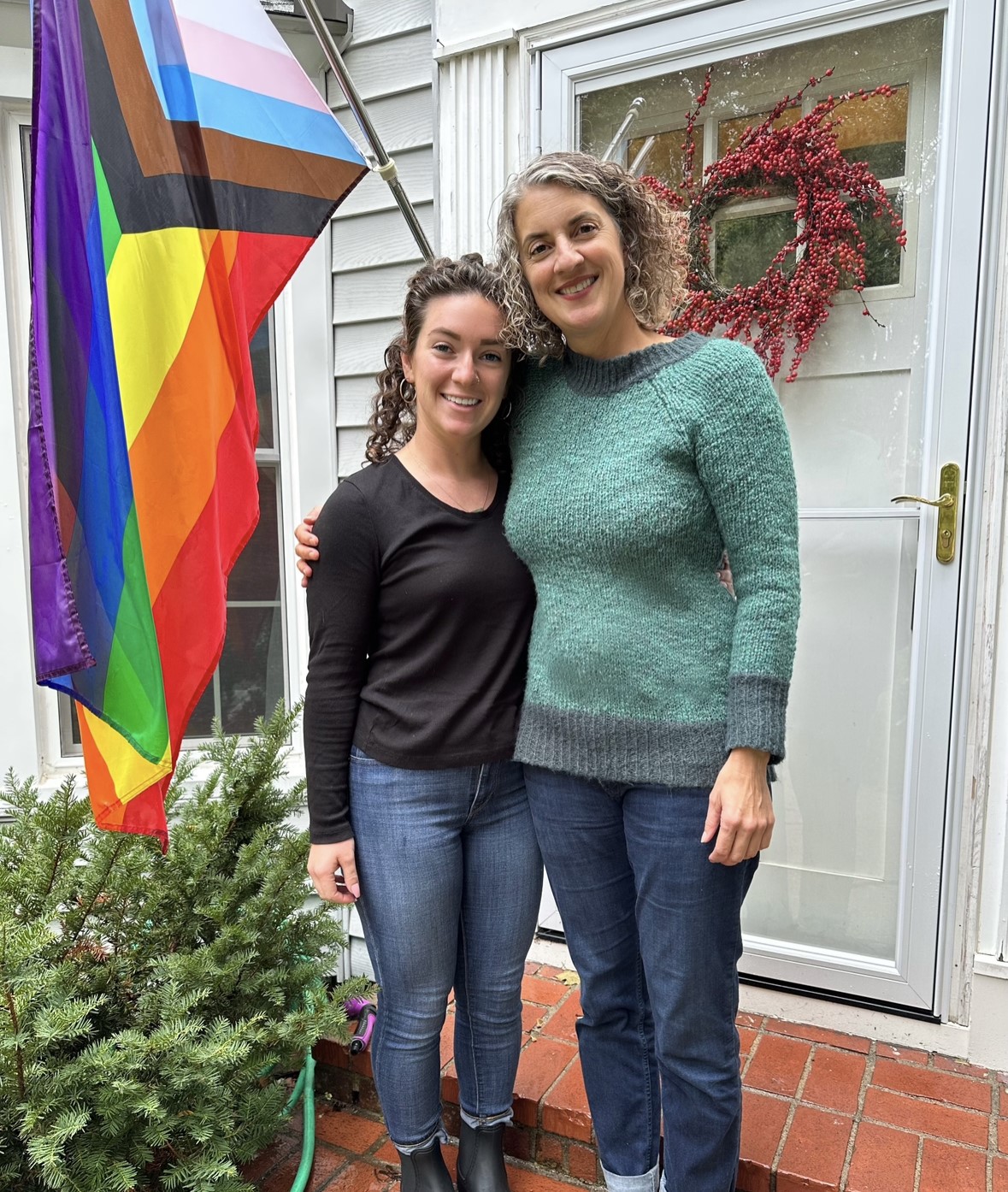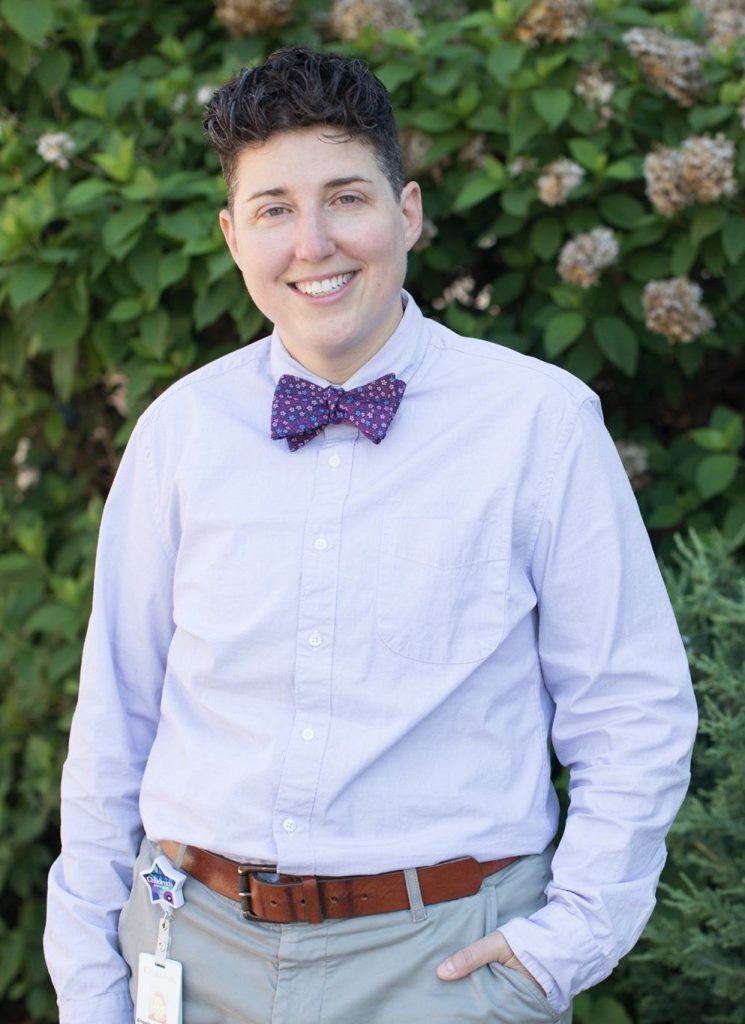
When folks outside of the LGBTQ+ community think about “coming out,” often it’s seen as a one-time event, something one does and then sets aside and moves on with their life. The reality is that “coming out” is a process that can unfold over many weeks, months or years. And after an LGBTQ+ person decides to “come out” to one person, there will be many, many more times an LGBTQ+ person will have to make decisions about when it is safe to be their authentic self and when they should choose to stay silent and unseen.
There are as many different coming out stories as there are people in the LGBTQ+ community. Two of my Children’s Minnesota colleagues, Fiona Donnelly and her mom, Kris Donnelly, generously share their story below: what it was like for Fiona, a teenager, to come out to her family and friends, and what it was like for Kris to receive the news.
Here are Fiona and Kris, describing their experiences in their own words.

What was the coming out process like for you?
Fiona: I was fortunate to have a largely positive, and anticlimactic, coming out process at home. I remember being in the car with my mom and she asked if I was interested in anyone. I suppose I could have told her no, but I answered that I was talking to a girl in my class. I honestly don’t remember how my mom responded, other than that it was very accepting and positive. I told my dad one morning when we were standing in the kitchen. He said something along the lines of, “OK, cool,” and gave me a hug.
Kris: I was slightly surprised when Fiona came out. She was working her way through her first heartbreak, which had been a relationship with a boy, so I wasn’t expecting it. But it wasn’t an issue for me or her dad. I remember feeling grateful that she felt comfortable telling us and that she was able to listen to herself and be herself at a young age. We fairly quickly shifted into worrying about what discrimination she might face at her Catholic high school — the protective mama bear was very near the surface of my emotions.
What inspired you to come out?
Fiona: I wouldn’t say that I was particularly inspired to come out, but it sort of just happened in the flow of conversation with my mom. I wasn’t afraid to tell my parents – I was simply a teenager who didn’t want to talk to my parents about who I was dating or interested in! But when my mom asked, I didn’t want to lie, and I believed that my parents would be accepting. They’d always been open and supportive of other gay people in our lives. My aunt had come out when I was a baby, and both she and her partner were always present in my life. My parents also left our church and religion altogether after a number of instances, including a homily urging everyone to vote yes on an upcoming marriage amendment which would have banned same-sex marriages in the state of Minnesota.
What was your life like before, during and after?
Fiona: There were no major differences in my life because of coming out, which I recognize is a blessing. I was slightly uncomfortable around some relatives who were not familiar or comfortable with the idea of me being gay, but that was manageable.
What was the best part about coming out?
Fiona: Though I didn’t recognize it as much then as I do now, being able to be open and honest with myself and others was the best part. It was, and still is, sometimes difficult to remember that I am not responsible for other people’s discomfort, but the more time that passes the easier that becomes. I am proud of who I am and proud of who I love. Being out allows me to share that with those who love and care for me, and that is the best part.
What was the hardest part?
Fiona: The hardest part was the fact that I went to a Catholic school, and that did present some challenges. I didn’t get the opportunity to come out to my peers on my own terms, because I was outed on social media. Rather than getting to tell my friends, I was answering their questions about whether it was true or not.
Of course, there were teachers and classmates that were openly against me being gay or at least my choice to come out. I still had to sit through religion classes that sometimes talked about it being a “sinful lifestyle” and felt the room’s eyes on me whenever this happened. But those instances and people were outliers. My closest friends and teammates encouraged me, supported me and significantly outweighed the difficult moments.
What was/wasn’t helpful from others during that time?
Fiona: It wasn’t helpful when people asked if it was “just a phase” or said, “What about ______?” and brought up any number of boys in my present or past.
Kris: We had gay friends and family so had journeyed with them and knew some of the joys and challenges they’d faced. That was really helpful. When my sister came out to me when Fiona was a baby, I realized how much emotional energy she’d had to use trying to be someone other than her true self. Witnessing the impact on her helped me understand the importance of being loved and accepted and knowing that ahead of coming out. We had also volunteered extensively for the Vote No campaign in Minnesota to defeat the marriage amendment which had strengthened our allyship and prepared us for how to have conversations with those who didn’t understand that being gay is your identity and not a choice. We weren’t just allies, but active allies and that also introduced us to new communities that provided great advice and understanding.
What wasn’t helpful was navigating the concerns from an older generation of family and friends about whether this was just a fad, as well as debates on whether she should share this publicly. They were operating from their fears and lack of understanding, but it added stress and pushed us away from keeping focused on Fiona and making sure she felt loved, accepted and supported.
What might be surprising for others to learn about this process?
Fiona: What might be surprising is the idea that with the right support system in place, coming out doesn’t have to be a massive announcement. It can be if that feels right for someone, but it doesn’t have to be. If you affirm, support and love those around you, they may just feel comfortable enough to share it with you in everyday conversation.
Kris: One of the most challenging and surprising things for us to navigate with Fiona was how to balance the normal teenage sleepovers with dating. Her partner was part of her group of closest friends. We really struggled with how to support time with her friends while limiting this relationship growing too deep too fast. There wasn’t any guide to help us.
It was a bit of an emotional rollercoaster during this timeframe, but it was much more about external factors. It was never about Fiona or her identity. The world isn’t always kind to the LGBTQ+ community and that still breaks my heart.
Looking back, is there anything you would have done differently?
Fiona: The only thing I would have done differently if I had the chance is be more open and more vocal. It’s been 10 years since I came out, and the world has changed so much in just that amount of time. I try to take every opportunity I can to move the dial forward, and if I had the chance to start doing that earlier, I would.
Kris: I wonder if I seemed too nonchalant when Fiona shared her identity with me. It wasn’t a big deal to us, but I worried later that maybe it was a big deal to her to come out. If I could do it again, I’d give her a giant hug immediately and say, “I’m so happy for you! Tell me more. What do you need from me?”
What advice would you give people who haven’t come out yet?
Fiona: Lean on those who love and support you until you feel safe to share. If your existing circle is not a safe one, I encourage you to reach out to LGBTQ+ friendly communities near you. I promise they will welcome you with open arms to love and support you in ways you could never imagine.
What advice would you give other parents?
Kris: Listen, really listen. This isn’t about you at all so keep your child at the center. Tell them you love them and show it. Be grateful they want to share this part of their life with you. It’s a gift to be included on their journey. Then find the support and guidance you need to process your emotions and be the best advocate you can be.
The beauty of Fiona and Kris’s story is not just the obvious love and support that exists in their family for everyone to show up as their authentic selves, but also the intention that Kris and her husband had to create safety in their family and for other LGBTQ+ people in their community.
Are you wondering what you can do to make your family a safe place for your kids to show up as their authentic selves? Do you have questions about how to respond to a family or friend’s coming out process? Check out these tips and resources for more information.

Dr. Kade Goepferd, (they/them)
Chief education officer and medical director of the Gender Health program
Dr. Kade Goepferd, (they/them), is the chief education officer, pediatrician and medical director of the Gender Health program at Children’s Minnesota. Dr. Goepferd is an advocate for advancing equitable health care for all children – including trans and gender-diverse youth. They have been named a Top Doctor by both Minneapolis/St. Paul Magazine and Minnesota Monthly for the last several years and gave their first TED talk, “The Revolutionary Truth about Kids and Gender Identity” at TEDx Minneapolis in 2020.
Follow me on Twitter, LinkedIn and Instagram.